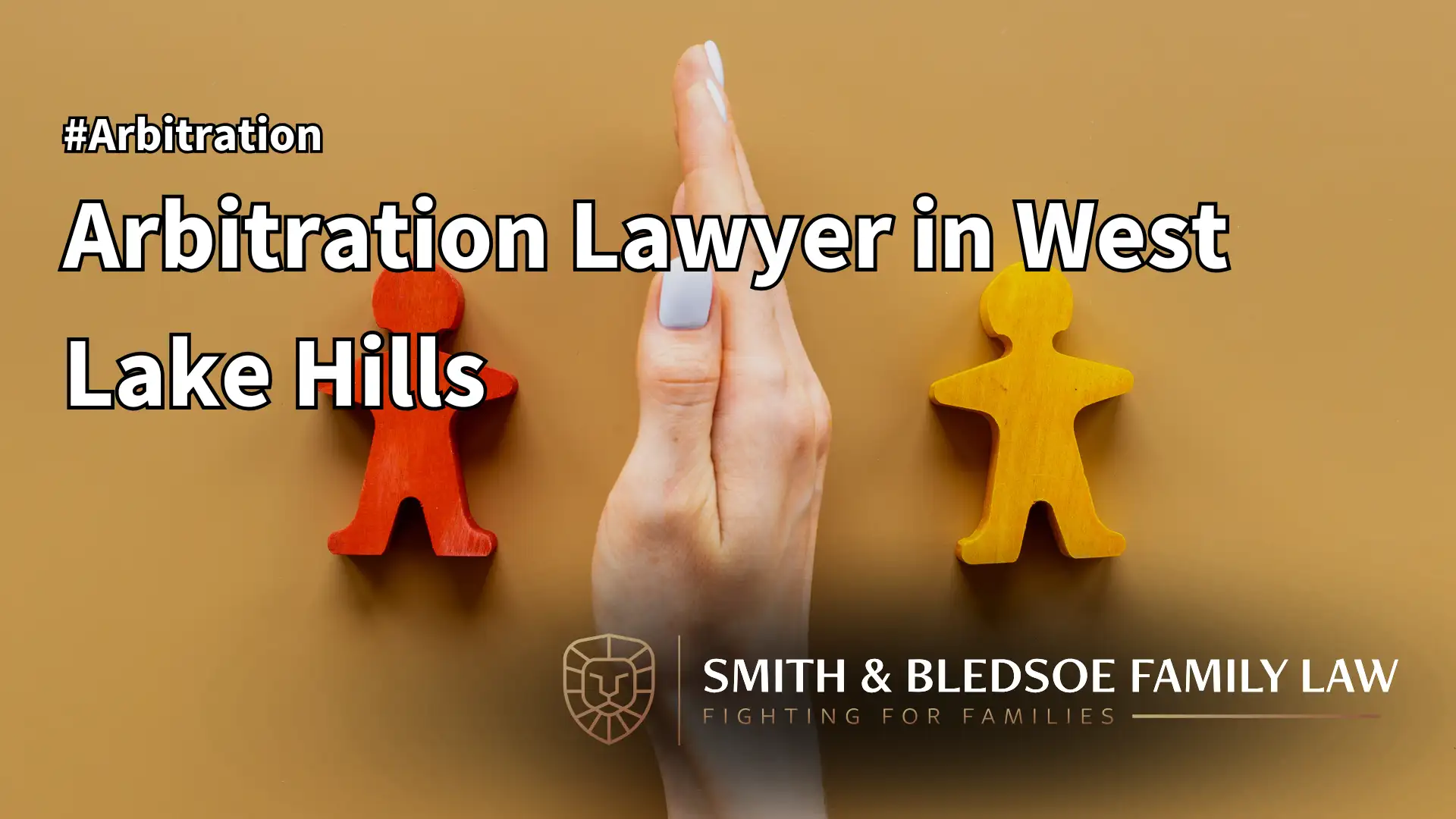
At Smith & Bledsoe Family Law, our divorce arbitration lawyers in West Lake Hills guide clients through this alternative dispute resolution process with skill and compassion. We understand the challenges divorcing couples face, and our experienced team can help you determine whether arbitration serves your best interests. Call us today for a free case evaluation with a skilled arbitration lawyer in West Lake Hills.
What Is Divorce Arbitration?
Divorce arbitration functions as a private alternative to traditional courtroom litigation. In this process, both spouses present their cases to a neutral third party (the arbitrator), who then makes decisions about contested divorce issues. Unlike a judge in court, the arbitrator works within a more flexible framework and follows a schedule convenient for all parties involved.
The arbitrator, typically an experienced attorney or retired judge with a thorough understanding of family law, reviews evidence and arguments from both sides before rendering decisions. These decisions can address any aspect of your divorce, including:
-
Property and asset division
-
Child custody and visitation
-
Spousal maintenance (alimony)
-
Child support
-
Retirement accounts
Arbitration offers couples privacy and control they cannot achieve through traditional litigation while still providing structure and resolution when direct negotiations fail.
Benefits of Choosing Arbitration
Arbitration presents numerous advantages for divorcing couples in West Lake Hills who seek alternatives to court proceedings. Chief among these are:
-
Privacy and confidentiality – Unlike public court hearings, arbitration occurs in private settings, keeping sensitive family and financial matters confidential.
-
Flexibility in scheduling – Sessions work around your availability rather than rigid court calendars.
-
Faster resolution – Arbitration typically concludes more quickly than litigation, which can drag on for months or even years.
-
Control over arbitrator selection – Both parties participate in choosing their arbitrator.
-
Reduced formality – The process follows less rigid procedural rules than in courtrooms, creating a less intimidating environment.
-
Cost efficiency – Despite upfront fees for the arbitrator, the overall costs often prove lower than extended litigation.
Arbitration vs. Mediation
People often confuse arbitration with mediation, but these alternative dispute resolution methods differ significantly. Understanding these differences can help couples decide which approach best suits their situation.
In mediation, a neutral third party (the mediator) facilitates communication between spouses, helping them reach mutually acceptable agreements. The mediator cannot impose decisions but can only assist the parties in finding their own solutions. This collaborative approach works well when couples maintain relatively amicable relationships and demonstrate a willingness to compromise.
Arbitration, conversely, resembles a private court proceeding. The arbitrator listens to both sides and then makes decisions much like a judge. These decisions can be binding or non-binding, depending on the agreement between parties beforehand.
Key differences between arbitration and mediation include:
-
Decision-making authority – Mediators facilitate agreements; arbitrators make determinations
-
Structure – Mediation follows a more flexible format; arbitration adheres to a structured presentation of cases
-
Outcome control – In mediation, spouses maintain control over all decisions; in arbitration, the arbitrator determines outcomes
-
Formality – Mediation sessions feel more conversational; arbitration proceedings resemble informal trials
-
Finality – Mediation concludes only when both parties agree; arbitration ends with the arbitrator’s decision
Some divorcing couples engage in mediation first, attempting to resolve matters collaboratively before proceeding to arbitration for any remaining disputed issues. This tiered approach, sometimes called “med-arb,” maximizes opportunities for self-determined outcomes while achieving a resolution of all matters.
When to Consider Arbitration for Your Divorce
Arbitration serves certain divorce situations particularly well. Consider this option if:
-
Your family or financial matters require discretion beyond what public court proceedings offer
-
Court calendars cannot accommodate your professional or personal commitments
-
Your situation involves complex business assets, international property, or other unique circumstances
-
You desire a faster resolution
-
You want control over who decides your case
-
You wish to avoid courtroom anxiety
However, arbitration may not suit every situation. Exercise caution if:
-
Power imbalances exist between spouses, as one party might feel pressured into unfavorable agreements
-
Domestic violence history affects the relationship
-
You worry about compliance with the final determinations
-
You need court-ordered disclosure of information the other spouse might withhold
Our divorce arbitration attorneys in West Lake Hills help clients evaluate whether arbitration aligns with their specific circumstances. When you meet with us, we will explain both the advantages and potential drawbacks of this approach.
The Arbitration Process
Understanding the typical arbitration process can help clients prepare for this alternative dispute resolution method. While procedures vary somewhat between cases, most divorce arbitrations follow these general steps:
-
Initial agreement to arbitrate – Both parties consent to arbitration, either through a pre-existing agreement or mutual decision during divorce proceedings.
-
Arbitrator selection – The spouses jointly choose an arbitrator, often from lists provided by professional organizations or their attorneys.
-
Preliminary hearing – The arbitrator meets with both parties and their lawyers to establish procedural rules, scheduling, and the scope of issues requiring resolution.
-
Discovery exchange – Parties share relevant financial documents, property information, and other evidence according to the agreed-upon schedule.
-
Pre-hearing briefs – Attorneys submit written arguments and supporting evidence before formal hearings begin.
-
Arbitration hearings – Similar to simplified court proceedings, each side presents its case through testimony, documents, and arguments.
-
Arbitrator’s decision – After considering all evidence, the arbitrator issues a written decision (award) addressing all contested matters.
-
Conversion to court order – The arbitration award typically gets filed with the court and incorporated into the final divorce decree.
Binding vs. Non-Binding Arbitration
Divorcing couples must decide whether their arbitration will be binding or non-binding.
-
Binding arbitration produces decisions with the same enforceability as court judgments. Barring exceptional circumstances, parties cannot appeal these decisions, making this approach appropriate when couples want definitive resolutions. Most divorce arbitrations take this form to provide certainty and finality.
-
Non-binding arbitration serves more as an advisory process. Either spouse may reject the arbitrator’s decision and proceed to court if they find the outcome unacceptable. This approach proves useful when parties want professional guidance but remain hesitant to relinquish their ultimate decision-making authority.
Enforceability of Arbitration Agreements
Texas law generally supports the enforceability of arbitration agreements in family law matters, including divorce. However, certain factors affect whether courts will uphold these agreements:
-
Voluntary consent – Both parties must enter the agreement without coercion or duress.
-
Fair opportunity – Each spouse needs a meaningful opportunity to review terms before signing.
-
Clear language – The agreement must specifically identify the issues subject to arbitration.
-
Legal representation – Both parties should have access to independent legal counsel.
-
Fundamental fairness – The process must provide basic procedural protections.
-
Child-related limitations – Courts maintain oversight regarding children’s best interests.
Costs of Divorce Arbitration

-
Arbitrator fees (typically $300-$500 per hour, sometimes with minimum day rates)
-
Administrative costs (filing fees, hearing room rentals, and case management expenses)
-
Attorney representation
-
Expert witness fees
When evaluating these costs, consider potential savings from:
-
Shorter timeline
-
Streamlined process
-
Focused scope
-
Flexible scheduling
Our West Lake Hills arbitration lawyers will provide transparent cost estimates based on your specific circumstances, helping you make informed financial decisions about your divorce approach.
High-Asset Divorce and Arbitration
High-asset divorces particularly benefit from arbitration due to their complexity and privacy concerns. When substantial wealth, business interests, or investment portfolios require division, arbitration offers several advantages:
-
Focused knowledge – You can select arbitrators with business valuation, real estate, or financial forensics backgrounds.
-
Confidentiality – Sensitive financial information remains private and protected from public disclosure.
-
Business continuity – Expedited proceedings can minimize disruption to business operations.
-
Tax efficiency – Arbitrators with the relevant specializations will understand the tax implications of various asset division approaches.
-
International considerations – Arbitrators with relevant experience can address cross-border assets.
Our arbitration attorneys serve high-net-worth clients throughout West Lake Hills with discretion and a sophisticated understanding of complex asset protection concerns during a divorce.
Frequently Asked Questions
Here are the answers to some of our most frequently asked questions about divorce arbitration.
Can we choose which issues go to arbitration?
Yes. You maintain flexibility to arbitrate specific contested matters while resolving others through direct negotiation or mediation. This targeted approach focuses resources on truly disputed issues.
How long does divorce arbitration typically take?
Most divorce arbitrations conclude within 3-6 months from initial agreement to final decision. This timeline contrasts favorably with court proceedings, which often extend 12-18 months in contested cases.
Can arbitration decisions be appealed?
Binding arbitration offers limited grounds for appeal (primarily issues of arbitrator misconduct or decisions exceeding the authorized scope). Courts rarely overturn arbitration awards based on substantive disagreement with outcomes.
Will I still need my own attorney for arbitration?
Yes. While arbitration provides a more streamlined process than court, the legal issues remain complex. Your attorney will represent your interests and safeguard your rights.
Can we modify an arbitration decision later?
Certain aspects of divorce decrees, such as child custody and support, remain modifiable when circumstances change substantially. This is true regardless of whether they originated from arbitration or court proceedings. However, property division typically remains final.
Contact Our West Lake Hills Arbitration Lawyers
At Smith & Bledsoe Family Law, we understand the emotional and financial stakes of divorce. Our has decades of combined legal experience handling arbitration cases. We focus on protecting your interests while minimizing conflict, expense, and emotional strain.
Call us today for a free case evaluation with a divorce arbitration lawyer in West Lake Hills.